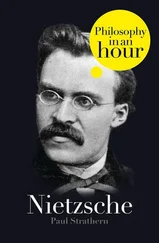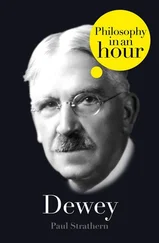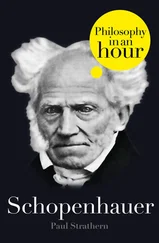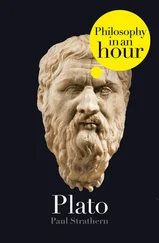Leibniz
PHILOSOPHY IN AN HOUR
Paul Strathern
Cover
Title Page Leibniz PHILOSOPHY IN AN HOUR Paul Strathern
Introduction Introduction Leibniz was the archetypal caricature genius. He lived a life rich in incidents of high farce, of whose nature he was seldom aware. He knew everything about everything, yet he simply didn’t understand how ordinary people thought and behaved. This said, he was certainly one of the more presentable philosophers (though this probably says more about philosophers than about Leibniz). He appeared at courts throughout Europe, where the royals and aristocrats even took him seriously (though this probably says more about the royals and aristocrats …). For almost his entire adult life Leibniz was employed by the court at Hanover – and several other courts at the same time. He always took on as many appointments as he could and insisted upon being paid the full salary for these positions. He would become highly indignant when his pay was stopped because his employers had heard he was off working somewhere else. To list Leibniz’s achievements would once again make him sound like a parodic exaggeration of genius. In fact it’s impossible to list all his ideas and discoveries, many of which he kept in a trunkload of papers that have yet to be published in their entirety. Fortunately Leibniz is of interest to us mainly as a philosopher. Yet even here the picture remains unclear. Bertrand Russell, who wrote one of the finest critical works on Leibniz’s philosophy, was of the opinion that Leibniz had produced two philosophies. The first was a simple philosophy for public consumption: a shallow optimistic metaphysics intended to delight princesses. His other, less optimistic ideas he consigned to his trunk. These were part of a more complex, logical, and profound system which could only be understood with difficulty by minds of the caliber of Leibniz himself (and Russell, of course). Characteristically, both of these philosophies remained unfinished – if indeed they really are two separate philosophies. Most other commentators, not having minds equal to Leibniz or Russell, claim that the simple philosophy and the complex one are really part and parcel of the same thing – which is neither as simple nor as complex as its two parts. Having cleared up these basic points, we may now proceed to Leibniz’s life.
Leibniz’s Life and Works
Afterword
Further Information
From Leibniz’s Writings
Chronology of Significant Philosophical Dates
Chronology of Leibniz’s Life
Recommended Reading
About the Author
Copyright
About the Publisher
Leibniz was the archetypal caricature genius. He lived a life rich in incidents of high farce, of whose nature he was seldom aware. He knew everything about everything, yet he simply didn’t understand how ordinary people thought and behaved. This said, he was certainly one of the more presentable philosophers (though this probably says more about philosophers than about Leibniz). He appeared at courts throughout Europe, where the royals and aristocrats even took him seriously (though this probably says more about the royals and aristocrats …). For almost his entire adult life Leibniz was employed by the court at Hanover – and several other courts at the same time. He always took on as many appointments as he could and insisted upon being paid the full salary for these positions. He would become highly indignant when his pay was stopped because his employers had heard he was off working somewhere else.
To list Leibniz’s achievements would once again make him sound like a parodic exaggeration of genius. In fact it’s impossible to list all his ideas and discoveries, many of which he kept in a trunkload of papers that have yet to be published in their entirety. Fortunately Leibniz is of interest to us mainly as a philosopher. Yet even here the picture remains unclear. Bertrand Russell, who wrote one of the finest critical works on Leibniz’s philosophy, was of the opinion that Leibniz had produced two philosophies. The first was a simple philosophy for public consumption: a shallow optimistic metaphysics intended to delight princesses. His other, less optimistic ideas he consigned to his trunk. These were part of a more complex, logical, and profound system which could only be understood with difficulty by minds of the caliber of Leibniz himself (and Russell, of course). Characteristically, both of these philosophies remained unfinished – if indeed they really are two separate philosophies. Most other commentators, not having minds equal to Leibniz or Russell, claim that the simple philosophy and the complex one are really part and parcel of the same thing – which is neither as simple nor as complex as its two parts. Having cleared up these basic points, we may now proceed to Leibniz’s life.
His life began, seriously enough, on July 1, 1646, in Leipzig. Three years later came the end of the Thirty Years War, which had swept through Europe and left Germany in a state of devastation. This catastrophe was to cast its shadows over the European political scene for decades to come, in much the same way that the shades of World War II have only recently begun to fade in Eastern Europe.
Leibniz’s father, Friedrich Leibnütz, was professor of moral philosophy at Leipzig University. His mother, Catherina, nee Schmuck, was Friedrich’s third wife. Their son was christened Gottfried Wilhelm Leibnütz (he was to change the spelling of his family name at the age of twenty). When Leibniz was just five years old his father died, leaving him and a sister to be brought up by their mother. According to all reports Catherina was a great believer in peace and harmony, who never spoke ill of anyone. Normally one would look upon this as a bit of the usual mythology. But in this case it must have been true. Leibniz was deeply affected by his mother and retained these very characteristics of hers to the end of his days. Despite everything (and this everything was to be quite something), Leibniz’s life was deeply harmonious. His long-term secretary Eckhart records that he never heard him speak ill of anyone. Leibniz’s philosophy too is permeated with a deep sense of harmony, and his lifelong political endeavours were invariably motivated by an attempt to bring harmony to the European scene.
Leibniz did go to school but said that most of his education was conducted at home, reading through his father’s library. He always claimed that he was self-taught, and it shows, even at this supreme level of genius. As a boy he read obsessively, following his train of thought as the fancy took him – until the entire floor of the library and all the tables and chairs were covered with opened books. The boy is all too recognizable in the man. In adult life Leibniz was capable of hatching half a dozen brilliant crackpot schemes in a week. These could range from a submarine to an entirely new form of clock, from a revolutionary lantern to a coach as fast as a modern car (when the roads were still only rutted tracks), from a horizontal windmill to a machine for measuring good and evil – none of which would ever be finished. Eat your heart out, Leonardo.
By the age of fourteen Leibniz was ready to take on the University of Leipzig. Here he studied law, quickly expanding his studies to include all possible interpretations of this subject, including the laws of physics, the laws of philosophy, the laws of mathematics, and almost the entire political concept and history of law. It was during this period that Leibniz first came across the writings of such celebrated lawyers as Galileo, Descartes, and Hobbes, who were revolutionizing scientific, philosophical, and political thought. Characteristically, Leibniz soon conceived the idea of harmonizing all this radical thought with the Scholasticism that it was in the process of replacing. In his spare time Leibniz became an avid student of alchemy (with the aim of reconciling it to chemistry), and he also wrote a paper that set out the theoretical basis for a computer (almost three hundred years before Turing’s seminal work on this subject).
Читать дальше












